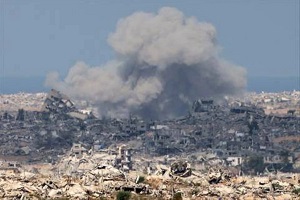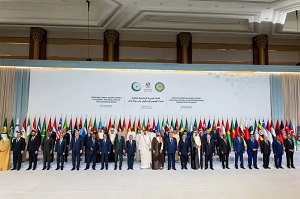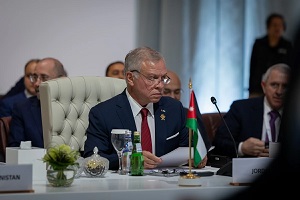Arab options and Israel’s countermoves - By Hasan Dajah, The Jordan Times
The final statement issued by the Arab and Islamic Summit in Doha represented a pivotal moment in dealing with the recent Israeli attacks on Qatar, whose impact extended to Lebanon and Syria. The tone of the statement, which combined strong condemnation with a call for legal and diplomatic deterrence mechanisms, reflects a shift in the Arab and Islamic mood toward seeking collective steps beyond mere denunciation and condemnation. However, the most important question remains: How might the positions of Arab states evolve regarding these attacks? And what might Israel offer in response? Anticipating future scenarios opens the door to understanding the current balance of power and the possibilities for escalation or containment.
The first scenario is for Arab states to take a collective escalatory stance, translated into practical diplomatic and legal steps against Israel, most notably a serious push to suspend its membership in the United Nations and pressure to impose economic and military sanctions. This scenario is contingent on the ability of Arab capitals to achieve broad political consensus that translates the final statement into practical measures, with key countries such as Saudi Arabia, Egypt, and Algeria accepting a leadership role. The chances of this scenario's realization are moderate, as it clashes with the will of major international powers, such as the United States and Europe, which still view Israel as a strategic partner that cannot be isolated. However, Israel's continued attacks on non-Palestinian countries, as happened in Doha, could give this path greater momentum and make it difficult for Western capitals to continue providing diplomatic cover for Israeli behavior.
The second scenario moves toward a defensive-security approach, based on strengthening the concept of collective Arab and Islamic security through military and political deterrence mechanisms, while developing the ability to respond in kind if attacks recur. This path could be embodied in greater military or intelligence coordination between some of the directly targeted Arab countries, such as Qatar, Lebanon, and Syria, with political support from other countries. The condition for its realization is overcoming inter-Arab differences and prioritizing collective security over ideological and political differences. The chances of this scenario's realization remain limited to weak in the near term, as the Arab world suffers from deep structural divisions, and it is difficult to imagine a solid defensive alliance without international consensus to support it. However, Israel's escalation of its attacks, especially on internationally recognized sovereign territories such as Qatar, could provide a real incentive to move this path forward, albeit gradually.
The third and most likely scenario is to be content with balanced political and diplomatic steps, including continued legal and international pressure on Israel, and the promotion of its files in the Security Council and international courts, in parallel with increased humanitarian and political support for the Palestinian cause. This scenario is consistent with the Arab policies that have been in place over the past decades, combining rhetoric of condemnation with action in international legal arenas without reaching the threshold of escalation on the ground. The condition for its realization is broad Arab consensus to avoid being drawn into a direct military confrontation, while capitalizing on the growing international momentum against Israel's practices, especially in light of the documented violations in Gaza and the West Bank. The chances of this scenario being realized are high, as it offers a balanced solution that preserves Arab unity and gives countries room to maneuver vis-à-vis the international community without risking widespread military and economic repercussions.
In contrast, Israel faces three possible scenarios. The first is continued escalation by intensifying its strikes against Qatar, Lebanon, and Syria to send a dual deterrent message: first, to the Arab states acting as mediators, and second, to the international community, that it will not retreat from its policy of preemptive attack. The condition for this scenario is continued Western cover and the absence of tangible Arab deterrence. The chances of its realization are moderate, as the political and diplomatic cost increases with each new attack.
The second scenario for Israel is tactical de-escalation, by reducing attacks and focusing on the Palestinian front, to reduce international pressure and avoid collective Arab steps that could threaten its position in international institutions. This scenario is contingent on the ability of its Western allies to convince it of the value of self-restraint. The chances of its realization are relatively high, especially if the Israeli government finds itself facing the threat of growing isolation. The third path is diplomatic-legal counter-escalation, meaning Israel's attempt to leverage its influence in Western capitals to undermine any Arab moves toward suspending its UN membership or imposing sanctions. The condition for this scenario to materialize is its success in portraying the Arab moves as "political" and unrealistic. The chances of this happening are high, as the international balance of power remains in its favor in many UN institutions.
Among these scenarios, it appears that the short term will witness a combination of the third Arab scenario (diplomatic and legal action) and the second Israeli scenario (tactical de-escalation). Meanwhile, mutual military escalation remains a real possibility, though less likely, unless Israel launches a new provocation that crosses regional red lines. Ultimately, the future of the situation remains tied not only to the degree of Arab unity, but also to the willingness of international powers to impose international law on Israel, or to continue their policy of turning a blind eye that encourages it to persist.
Hasan Dajah is professor of Strategic Studies at Al-Hussein Bin Talal University
Latest News
-
 Israel launches ground assault on Gaza City
Israel launches ground assault on Gaza City
-
 Qatari emir to arrive in Amman Wednesday for talks with King Abdullah
Qatari emir to arrive in Amman Wednesday for talks with King Abdullah
-
 ‘Gaza is burning,’ Katz says after night of intensive 'Israeli' bombardment
‘Gaza is burning,’ Katz says after night of intensive 'Israeli' bombardment
-
 Arab-Islamic Summit issues final statement, condemns Israeli attack on Qatar, calls for accountability
Arab-Islamic Summit issues final statement, condemns Israeli attack on Qatar, calls for accountability
-
 King delivers Jordan's address at Emergency Arab-Islamic Summit in Doha
King delivers Jordan's address at Emergency Arab-Islamic Summit in Doha